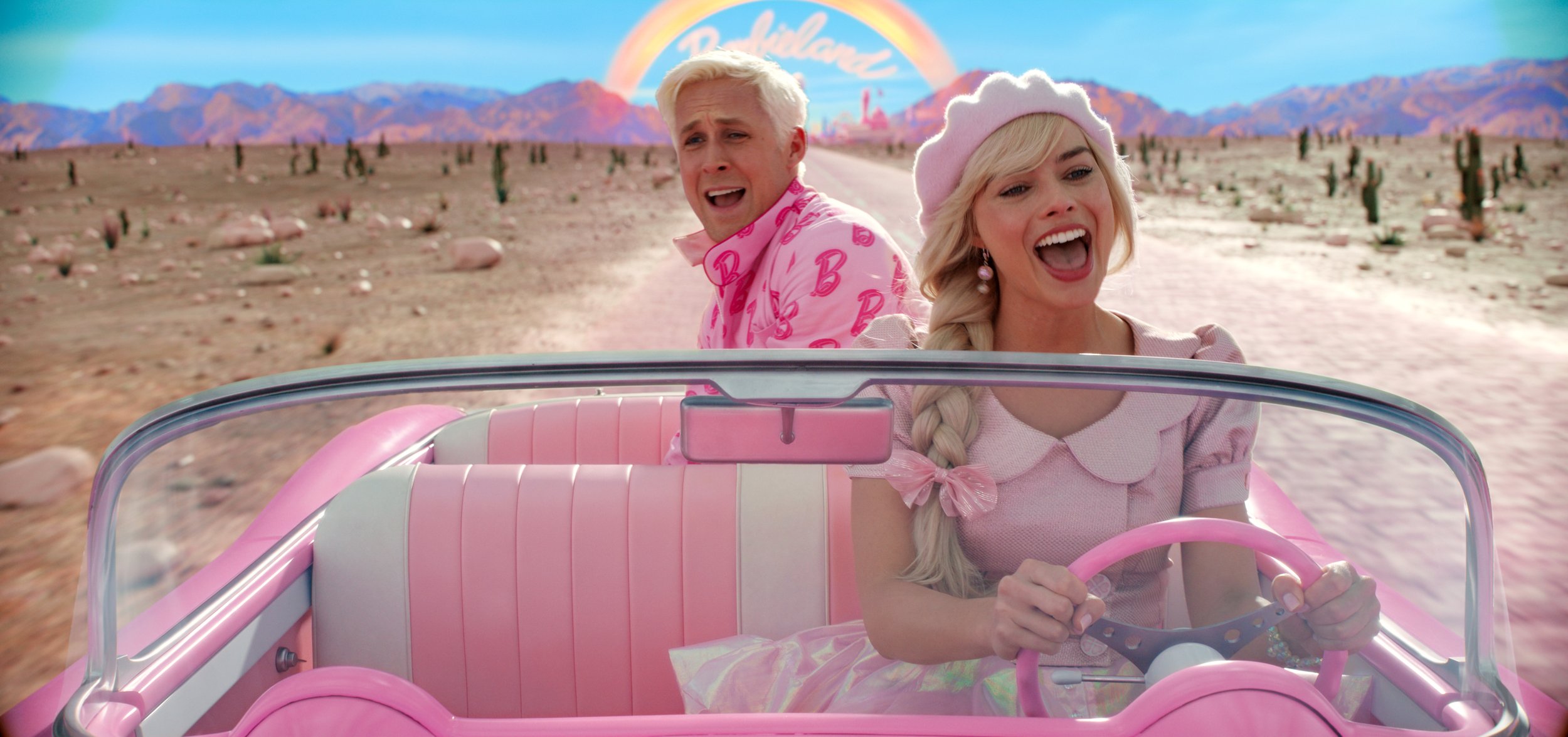Review: 'Barbie' brings the plastic doll, and a smartly funny meta-analysis of her, to the big screen
Director Greta Gerwig’s “Barbie” manages a juggling act I don’t think I’ve ever seen in a movie before: It celebrates a corporate symbol of plastic packaged conformity while also being a subversive, proudly feminist critique of that symbol.
What’s equally surprising is that it’s really funny and, at times, heart-warming.
Gerwig, writing with her regular partner (in screenplays and in life) Noah Baumbach, starts with some history, of how in 1959 the company Mattel Inc. introduced the Barbie doll, a 12-inch plastic paragon with long legs, big breasts and no genitals. In an age when dolls were almost always babies, and playing with them required girls to behave like mothers, an adult figurine who could hold down a job and own a house was revolutionary. (Gerwig breaks out the “Also Sprach Zarathustra” to illustrate this change, “2001”-style. It was released months ago, in the movie’s first trailer.)
Barbieland, as Gerwig shows it, is a fantasia of pink, where all the Barbies do all the important jobs — president (Issa Rae), physicist (Emma Mackey), and so on — and still get together at the dream house of Stereotypical Barbie (Margot Robbie) for a well-choreographed dance party.
Also attending the dance party are all the Kens, adjuncts to the Barbies. As the narrator (Helen Mirren) explains, Barbie is always happy, but Ken — the lead one is played by Ryan Gosling — is only happy “when Barbie looks at him.”
But is Stereotypical Barbie really happy? In the middle of the dance party, she asks out loud, “Do any of you guys think about dying?” This stray thought freaks out our Barbie, as does the discovery that her feet — previously contoured to fit into her high heels — have literally gone flat. Barbie consults the wisest of the Barbies: Weird Barbie (Kate McKinnon), who has uneven hair, is always doing the splits and “smells like basement,” because of being played with too roughly.
For Stereotypical Barbie to figure out what’s happening to her, Weird Barbie says, she must travel to the Real World. She barely gets out of Barbieland when she finds Gosling’s Ken is hiding in the back seat of her pink Corvette, tagging along for the ride.
In the Real World, Barbie makes the harsh discovery that most women don’t think of Barbie as empowering to women. She learns this by meeting Sasha (Ariana Greenblatt), a surly middle-schooler, and her frazzled mom, Gloria (America Ferrara) — who works at Mattel, whose CEO (Will Ferrell) and yes-men (and they are all men) are freaking out that a Barbie has gotten loose. (Ferrell’s performance is perhaps the one sour note in the movie, too much like his Lord Business character from “The LEGO Movie.”)
Ken, meanwhile, makes a discovery of his own: Something called “patriarchy.” The results are potentially catastrophic, both to Barbieland and Mattel.
Gerwig and Baumbach take some deep dives into the more controversial parts of the discontinued Barbie product line (do you remember Video Girl Barbie? Earring Magic Ken? Ken’s friend Allan? Barbie’s pregnant friend Midge?) and some of the unanswered mysteries of the franchise — like, where does Ken live when Barbie is alone in her Malibu DreamHouse?
The movie also wrestles with Barbie’s place in women’s lives, and how the contradictions of Barbie — an adult aimed at children, sending mixed messages about feminine beauty and health, and so on — are echoes of the micro- and macro-battles real women wage every day. Ferrara delivers a deliciously sharp monologue about this, in a moment that should evoke as much applause as laughter.
Robbie gives what’s perhaps the best performance of her career — funnier than Harley Quinn, more touching than Tonya Harding in “I, Tonya,” more alluringly innocent than Sharon Tate in “Once Upon a Time in Hollywood.” She takes this amorphous idea of the Barbie doll and finds her heart and soul, and makes her a fully realized woman.
And I’ll be damned if the guy doesn’t nearly steal the movie from her. Gosling’s portrayal of Ken is an astonishing comic performance, capturing the fragility of Ken’s ego and the unearned bravado that his embrace of his newly discovered machismo provides. Gosling does something very few Barbie-playing girls (or boys) have ever done before: He makes Ken necessary.
“Barbie” is also a movie that will reward repeat viewings, as the layers of jokes and references are thick enough that you probably missed a few of them. (I haven’t even mentioned the musical numbers.) Robbie’s Barbie and Gosling’s Ken turn out to be fun company on this offbeat road trip.
——
‘Barbie’
★★★1/2
Opened Friday, July 21, in theaters everywhere. Rated PG-13 for suggestive references and brief language. Running time: 114 minutes.
